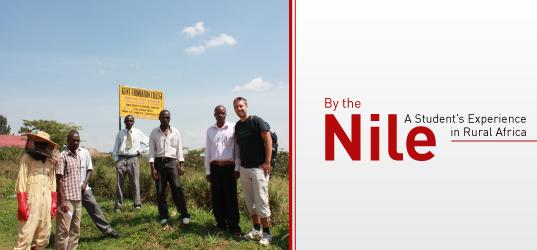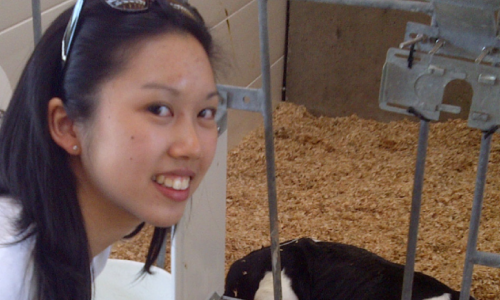
Craig Vandermeer, SFU student & TA spoke to the OLC last week regarding his international Co-op experience. Having finished his undergrad at Carleton University with a degree in Political Science, he is continuing his education here at SFU in the International Studies Master’s program. Craig recently returned from an International Work Term in Mbarara, Uganda. Craig worked with Dr Pamela Mbabazi, the Deputy-Vice Chancellor of Mbarara University of Science and Technology, through Students For Development.
The OLC presents the following as Vandermeer’s first interview with the OLC after his return from Uganda Fall Semester 2010:
"...I believe every student should experience the developing world regardless of the field of study."
– C. Vandermeer, SFU International Studies
Can you start by giving us a little background on the program you participated in? How did you hear about it? And what made you decide to apply?
The program I participated in is called Students For Development, or SFD. Upper year undergraduates, as well as graduate students, are eligible to apply for the program. The specifics of each SFD program change on a year to year basis, as the priority themes of CIDA can, at times, change, even though that change is often slight. Normally the details of the program are released to universities in the spring (late March or early April). Students are then required to submit an application to their own department, which is then forwarded to SFU international, who then chooses the best applications and forwards them off to AUCC. The program is competitive, yet is certainly worth the time and effort of applying. Originally I thought I had no chance, and yet I am now answering interview questions about my overseas experience. Interested students can check out the SFD program website1. I encourage anyone and everyone to look it over and see what opportunities may be out there.
Where did you travel to? Tell us a little bit about your position and responsibilities.
For my SFD program I travelled to Mbarara, Uganda; a city of about 200,000 (although you wouldn’t know it as there was only one major street) located near the borders with Rwanda, Tanzania and the DRC. While I was in Mbarara I was working as a project assistant for the Deputy Vice-Chancellor of the Mbarara University of Science and Technology. During the work term, I completed three projects and initiated one for students that university to continue once I departed. The three projects varied from research to program development. I first worked on an oil research program, and then was requested to develop a program where students at the university could reach out to the local community through interacting with vocational schools.
What made you decide to do an international co-op?
I chose to do an international co-op because I recognized the value the opportunity would have on both my academic and professional careers. In 2009, I travelled to Africa where I volunteered with Habitat for Humanity. Upon returning from that experience I quickly recognized how valuable the experience once, even though it was only a few short weeks. Since that experience, I have always kept my options open, and have always looked for ways to go back to Africa. International co-op seemed like the perfect opportunity, combining experience with academic credit.
How did SFU Co-op prepare you for your international co-op work term?
The co-op coordinators go the extra mile to ensure you’re ready and as prepared as can be for the program. They also know about the opportunities around the globe, and how to really maximize your opportunities.
"As an international studies student, my education was not only a motivating factor but also provided a well-rounded background [for my] experience. My program certainly influenced my decision because of the support I received from the admin and faculty."
How does your international experience relate to your Master's degree?
As an MA student in International Studies, living and working in a developing country complements what I study/research on a day to day basis. I know that in the undergraduate International Studies program all students are required to complete an international component, something I truly think everyone should do, regardless of what they are studying. I know that this experience alone has added tremendous value to my education and to my MA at SFU.
How long were you abroad?
I left Canada on the 12th of September and returned on the 16th of December, so was away for over three months. The SFD program requires that students spend at least 90 days overseas.
“Even if you’re not aiming for a career in international development, working and living in a developing nation will greatly enhance your skill sets, and will give excellent conversation pieces for an interview.”
Did you work in a different language? Did you have the opportunity to learn a new language? How did you gain or improve upon your intercultural communication skills?
While Uganda was once a British colony the level of English spoken within the country varies dramatically. In the cities, it is not hard to get by with just English, but when you step outside Kampala and venture out into the more rural regions the use of English becomes less and less prevalent. There are over 40 languages spoken in Uganda, thus learning one was really not an option for me. But speaking to no one wasn’t a good alternative, either. I found myself resorting to my non-verbal communication skills. I now know the value certain cultural traditions holds. For example, the handshake in Uganda is much different from its Canadian counterpart. I also learned how attitudes, and especially patience, are easily recognized by the local population. If you remain positive, they will in turn reflect that positivity. But if you have a negative attitude, well you’ll just be making things much more difficult on yourself.
“Interacting with Bishop Jerome Bamunoba, now in his early eighties demonstrated to me how passionate Ugandans are… to making a difference for their country. When students cannot afford tuition, he subsidizes them with his own financing…to ensure youth receive a proper and formal education. Truly remarkable.”
What challenges, if any, did you encounter during your international experience? How did you overcome/ learn from them?
There were many challenges I was forced to overcome during this experience. Firstly, living in a developing country, especially one in sub-Saharan Africa, presents many medical challenges. I had to get many shots pre-departure, and take an anti-malaria pill daily…[That] became rather routine, but getting parasites from the uncooked food or feeling ill due to the general conditions were certainly challenges I had to cope with. Secondly, the comforts, such as electricity, hot/running water, the internet, and many more, which are part of our daily life in Canada are not nearly as accessible in Uganda. While I was well aware this was the case before travelling to Uganda, actually living without electricity makes you realize how important it is to us in Canada. However, I learned to live without these amenities and developed coping strategies which enhanced the cultural experience. I am now confident that regardless of the setting I can be successful and can adjust to whatever challenges arise.
That self-confidence is not only an important skill but one that is transferred to How did you fund/ finance the experience?
Students for Development is coordinated by AUCC (Association of Universities and Colleges Canada) and funded by the CIDA (Canadian International Development Agency) program was funded by AUCC/CIDA through the SFD grant. If you are successful in the application process then all of your expenses (up to $6500) related to the program are covered by a grant. Certainly, without the grant I know I could not have participated in the program.
"The world is becoming a more competitive place, and when students finish school they need as many advantages as they can get if they want to get into their desired fields. Experiences like this not only make students more competitive in the job market but they also provide excellent skill development, essential for any career."
Do you have any advice from your time abroad you’d give to students unsure of whether or not they want to work abroad?
While the experience is certainly more challenging in Africa than it is in Europe (I also completed an international co-op in the Netherlands as an undergraduate) or any other developed nation, the challenges add that much more value to the experience.
"One thing I wish I knew before I left for Uganda is, at times, things don’t go your way when in a developing nation…faced with a lot of bureaucratic red tape, you will face daily obstacles such as poor transportation conditions but, in light of all of this, one needs to be patient in removing themselves from the western way of thinking, in order to truly embrace the people and the culture of their new location."
So you’ve discussed some of the hardships you overcame during your international co-op, but how about any fun experiences? Did you get a chance to travel or participate in other activities?
Definitely. I got an opportunity to check out some of Uganda’s beautiful countryside. In the second week of November, I travelled with some friends to the source of the Nile, located in Jinja. The Nile is a truly impressive natural phenomenon, and while the sheer power of the river would frighten any we opted to take the plunge: hopped in a river rafting boat and tested one of Mother Nature’s most impressive forces. Although it certainly wasn’t as uncoordinated as I make it sound, as we signed up with a rafting company, Adrift, and with the help of a guide successfully made it down the 31km trail, overcoming some of the most intense and impressive rapids, a truly heart-pounding experience.
Has your work abroad influenced the way you teach/ TA. How so?
As a TA this experience has greatly added to my own understanding of the world outside of Canada, especially in a developing context. I think this experience adds credibility to my own status as a TA. My students recognize my own passion for the subjects we cover, and in turn, I believe they look to me for guidance.
“My international co-op not only taught me what it is like to live in a developing country but it also provided an opportunity to put context to what I have studied for the past several years. There is something to be said about experiencing development rather than reading about it.”
What is next for you? Has your time abroad influenced any future plans regarding your academic or professional career?
In 2010 I began an organization called Schools Building Schools. The organization has two purposes, one to provide students valuable experiences both in Canada and overseas, teaching them essential skills not a part of the standard undergraduate degree, such as grant writing, event planning, volunteer recruiting, web development, and all of the other essentials required for running an organization. The second goal is to raise funds and assist vocational schools in Africa to accomplish their goals. We focus on providing durable classrooms because of the high demand for adequate teaching space. The organization has now become a registered charity. My experience overseas in Uganda has further solidified my commitment to working on the Schools Building Schools initiative and has further motivated me to get students of all ages involved. I truly believe I will be working in the development field for the remainder of my career, a position solidified by my experience in Uganda.
Sounds like we’ll be seeing great things from you, Craig. So do you have any suggestions for students who are interested in the specific program you took part in?
Look into opportunities long in advance of any deadline or due date. Seek out all of the opportunities available, as there are many once you start looking. Find what interests you, because guaranteed it interests someone in the developing world.
That’s great advice. Thanks for sharing your experience with us, Craig! Good luck with everything.
Thank you, it was my pleasure.













